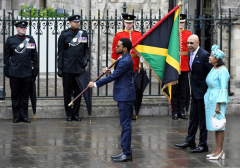Patrick Allen, the Governor-General of Jamaica, arrives to attend the coronation of King Charles and Queen Camilla at Westminster Abbey in London on May 6, 2023. Sentiment in Jamaica is growing to remove the British monarch as head of state. (Photo: Reuters)
KINGSTON, Jamaica – Many Jamaicans want their country to ditch King Charles as head of state but a bill presented by the government to do just that has frustrated some critics of the monarchy, who believe the change should go further to slash colonial ties.
Jamaica gained independence in 1962 but — like 13 other former British colonies including Canada and Australia — it still retains the British monarch as its head of state.
Public opinion on the Caribbean island of nearly 3 million people has been shifting for years, and in December the government of Prime Minister Andrew Holness presented a bill to remove King Charles.
Hundreds of thousands of enslaved Africans were shipped to Jamaica during transatlantic slavery, and many scholars and advocates say the legacy of slavery and colonialism has resulted in or played a role in enduring inequities. Growing calls by African and Caribbean nations for reparations to address past wrongs have added to a shift in sentiment across the region.
Britain has so far rejected calls for reparations. On the issue of removing the monarchy as head of state, Buckingham Palace usually says such matters are for the local people and politicians to decide. On a visit to the Bahamas in 2022, Prince William — who is now heir to the throne — said he supports and respects any decision Caribbean nations make about their future.
The Jamaican bill — which could be debated in parliament as early as this month or next — would have to be ratified in a referendum if passed.
Before that, some critics — including the opposition People’s National Party (PNP) — are raising objections to how a future president would be selected, what his or her role would be, and which court should be Jamaica’s final court of appeal.
Steven Golding, head of the Universal Negro Improvement Association, founded more than a century ago by Jamaican civil rights leader Marcus Garvey, said the group and others had long advocated for the
Read More





